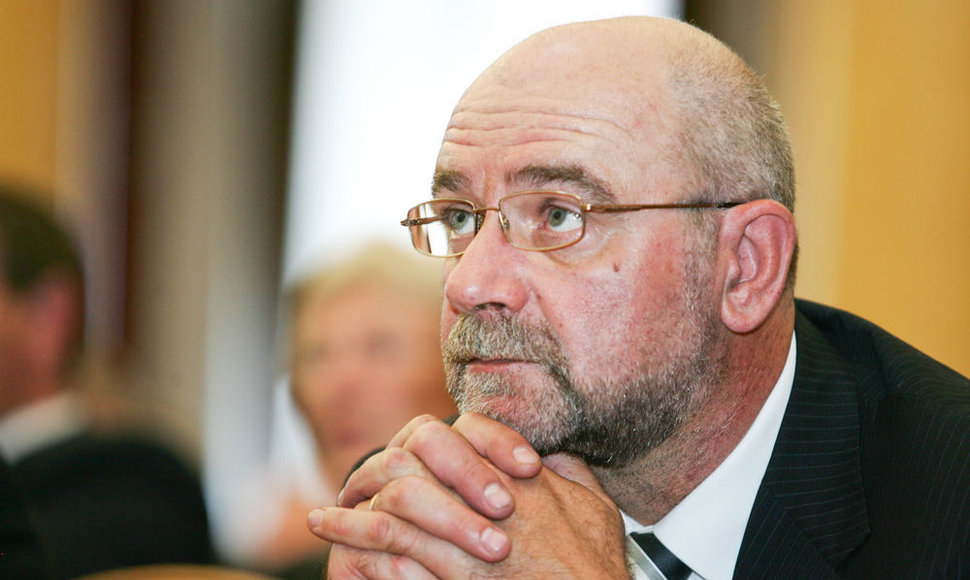Abišala once himself headed one of the first cabinets of post-Soviet Lithuania. Having served in the Supreme Council that declared Lithuania independent from the Soviet Union in March 1990, Abišala was minister at large in the third Government led by PM Gediminas Vagnorius. Later on, he himself became prime minister and headed the fourth Cabinet for four months – until the first democratic elections in autumn 1992.
He believes that the current coalition – the Social Democrats, the Labour Party, the Law and Justice Party, and the Electoral Action of Poles – do not have among their members any truly outstanding candidates whom the parties could defend until the end.
Parties should present their ministerial candidates before the election, instead of keeping them secret until the president gives her endorsement, he says.
- What do you make of the current process of government formation?
- What surprises me most is that parties have forgotten their main mission – which is to seek power and implement their platforms that citizens voted for. We have now accumulated enough experience, political parties are supported with public money, so they are perfectly capable of doing their job. All the flouncing, looking for outsider candidates only shows that being in power is seen as a goal in itself, used, as it were, to further one's own interests rather than to work for everyone.
- Would it not make more sense if voters knew who candidates for ministerial posts were before going to ballots? After all, one does not vote for a party name, but for its programme and its people. Not for thousands of its members but for those who will run the country.
- This is how it works in mature democracies. In the United Kingdom, there's no need to announce anything, since the opposition has a shadow cabinet of its own. When they hit the polls, people should know not only what parties are planning to do but also who is going to do it. In Lithuania, meanwhile, no names are disclosed even weeks after the election. It is the president's function to sift out hopelessly incompetent candidates, but parties themselves should be ready for work.
- Even after the election, party leaders are reluctant to disclose their candidates, saying it might negatively affect their reputation, should a candidate be rejected.
- I find this argument completely unacceptable. If one chooses to go into politics, one knows what to expect, one is prepared for public attacks, often unjustified. That's part of the job. On the other hand, it is one more proof that the parties simply do not have strong candidates they would be ready to back in case these were indeed people most suitable for leadership posts.
- The president has put forward a condition that the Labour Party propose non-member candidates. And indeed, many of the best-regarded ministers have been non-affiliated people – Finance Minister Ingrida Šimonytė, (President) Dalia Grybauskaitė herself. But how can a party implement its programme if it appoints an outsider to run things?
- All this is conditioned by poverty in human resources. The party democracy – and our civilization has yet to come with any other kind of democracy – demands that parties present themselves to voters, show what they are capable of, and actually do what they promise. On the other hand, there might be exceptions, especially in young democracies like our own. We've been running our state for two decades only – half the time that Moses spent wandering in the desert.
Ministers often join parties and become professional politicians. In general, I disagree with the president and would like to see party people implementing policies. In certain cases, one can invite people who are not party members yet to join. But there must be an affinity in their views, one must know political inclinations of these people. What happened with Mr Mindaugas Kuklierius (conservative whom the Labour Party proposed for the minister of agriculture) was a complete nonsense.
- After the election, winning parties first divide up ministries and only then, it seems, do they start seriously considering whom to appoint to head them. Oftentimes, they fail to find good professionals...
- I'd like to stress one thing – political professionals. Not medical doctors or people who know how to plough land or drive a train. Sure, it's great if they do, if the person is well familiar with the area he or she will head, but that is of secondary importance. The general practice around the world is that ministries are headed by people who are strong politicians and not necessarily experts of specific fields. There is an entire system in place to help them with details – ministers should know basic strategic things of each area.
Take, for instance, (Transport Minister) Eligijus Masiulis, who does not seem to have much in common with transportation, yet he was regarded as one of the better ministers in Andrius Kubilius' Cabinet. Or Minister of Justice Remigijus Šimašius. He certainly knew precious little about the prison system.
- You referred to conservative Kuklierius. The Labour Party, which goes out of its way insisting they have multiple good candidates for each post, chose an outsider. And not just any outsider – a member of an opposing party.
- Do you know anyone in the Labour Party who could make for a good minister of agriculture? Not to mention about the pending court cases against the party. It has been in politics for eight years – and we keep electing it to parliament – but the Labour Party has not shown once that its goal is to implement its programme by being in the government. It does not nurture ministers, does not promote them in the public, does not let them talk, argue, explain, come forward with their projects. Unfortunately, the Labour Party is hardly an exception. The same goes for all parties.
- What do you make of the president's intention to examine candidates' command of English?
- In high politics – which includes MPs and their assistants – one has no business if one does not speak at least two foreign languages. We are part of the EU and NATO, world is a global place, one cannot lock oneself within national borders. Statesmen must be communicative and fluent in languages other than just Lithuanian. We cannot expect that Europe will learn Lithuanian before Lithuania's EU presidency. Most of our politicians still cannot grasp how important this task is.
- Making sure that the candidates speak foreign languages – shouldn't that be a job for parties and not the president?
- Indubitably. I think, however, that this issue was blown out of proportions by the media. Fluency in English was not the main criteria (in the president's refusal to endorse some candidates).
- What was government formation like twenty years ago, when you had to do it?
- The political situation was different, there was no party system or tradition. We had the Sąjūdis movement, the Communist Party, and parliamentary structures. Then Sąjūdis started splitting up, factions appeared which later developed into parties.
The government was formed based on political reliability and qualification. As to our government, number four, there weren't any big arguments – many of the ministers stayed on from the previous Cabinet, since the tenure had a deadline – the approaching elections. It was a technical and provisional government whose task was to successfully hand over power to newly elected people. There is little ground to compare it to the current one.
This way or Cabinet formation is neither better nor worse – simply different. There were no alternative options. We did consult with parliamentary groups, the ministers went to introduce themselves. As fas as I can recall, no one was rejected.













